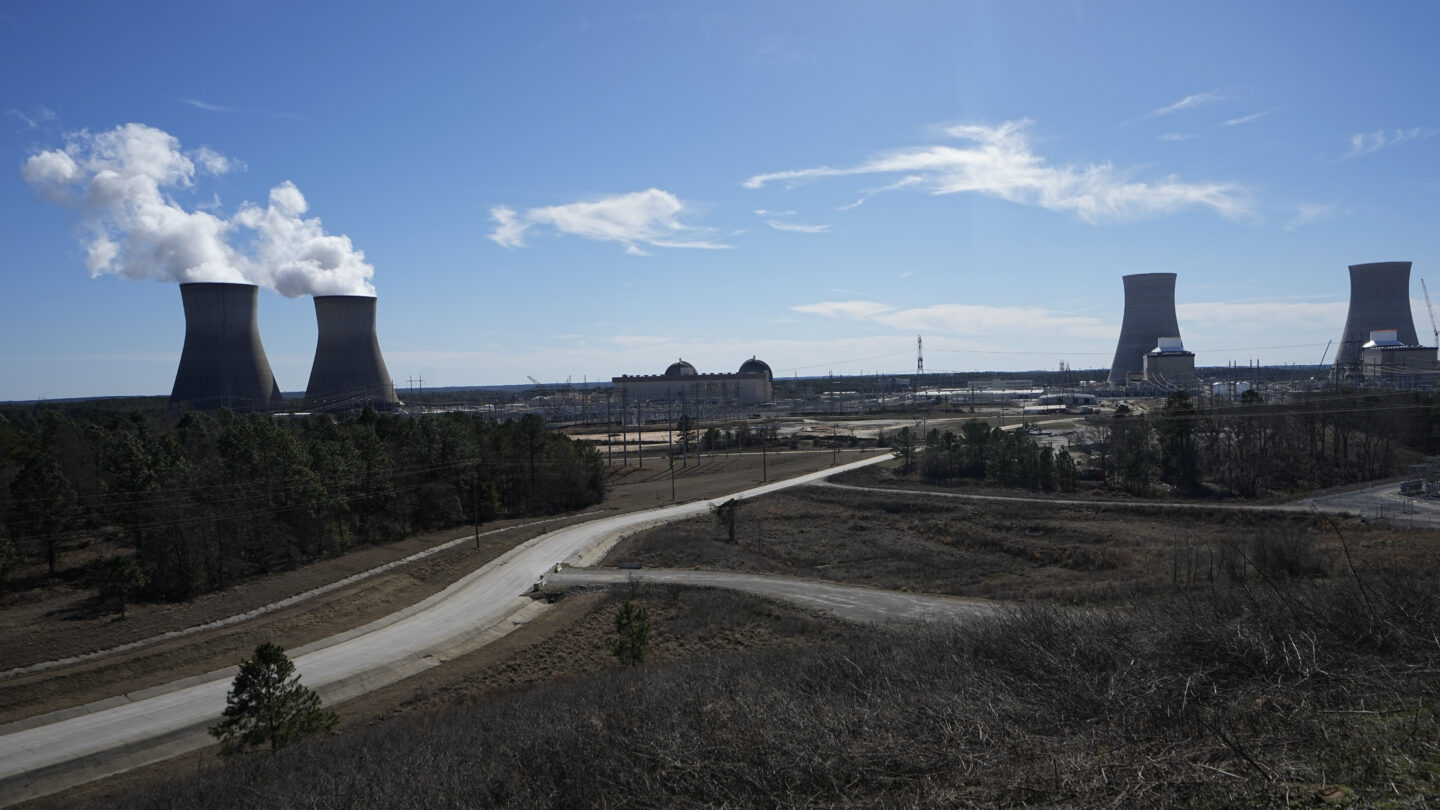Georgia Power, PSC staff strike deal to build new gas turbines

This coverage is made possible through a partnership with WABE and Grist, a nonprofit, independent media organization dedicated to telling stories of climate solutions and a just future.
Georgia’s largest electric utility would build new natural gas turbines, add batteries and buy more electricity under a surprise agreement filed early Wednesday.
If approved by the Georgia Public Service Commission, the deal between Georgia Power and the PSC’s Public Interest Advocacy staff would resolve the company’s unexpected request for more energy to meet a spike in demand from new businesses, particularly data centers and factories.
The agreement would greenlight most of that request.
After several rate hikes over the last 15 months, with another expected soon, Georgia Power is touting this agreement’s “downward pressure on rates” that it expects thanks to the many new customers.
“This agreement provides substantial customer protections and ensures that Georgia Power has the needed capacity resources to preserve and protect the valuable energy reliability that our customers expect and Georgia’s growing economy must have,” said Aaron Abramovitz, the utility’s chief financial officer, in a PSC hearing Wednesday.
However, consumer and environmental advocates are skeptical that this plan will improve customers’ bills. They’re also critical of its reliance on energy sources contributing to climate change.
“This is a fossil fuel bonanza that skips the regulatory processes in place to protect billpayers,” Jennifer Whitfield, an attorney with the Southern Environmental Law Center, said in a statement.
SELC and other environmental groups are especially concerned about approving new electricity-generating turbines that would be powered with natural gas and oil.
“It’s a commitment of resources that will last at least 46 years into the future [according to what] Georgia Power is projecting, and possibly longer than that,” said Bob Sherrier of SELC. “We know that we need to transition much faster than 40 years.”
This request from Georgia Power to add additional energy came as a surprise. Typically, the company reviews its long-range plans with the PSC every three years, but Georgia Power added this request just under two years ago. The utility said most of the unexpected increase in demand comes from data centers.
The Georgia legislature recently passed a bill to end a tax break for data centers, which could slow down the data center boom the state is currently seeing. The governor has yet to sign the bill.
The agreement filed this week is only final if the commissioners vote to approve it. Advocacy groups and stakeholders are still due to file their final comments with the commission and make closing statements, during which some said they plan to push for changes.
What’s in the deal
The new deal, known as a stipulated agreement, approves much of Georgia Power’s request and exempts several projects and purchases from the typical competitive bidding process.
That includes three new turbines at Plant Yates, in Coweta County, to be powered by natural gas and oil, two contracts to buy energy from other utilities, batteries to pair with existing solar energy at Moody and Robins Air Force Bases and half of the company’s request for further battery storage. The other half of that battery request would go through an expedited bidding process.
The deal also rejects Georgia Power’s request to build additional solar power with batteries.
Several advocates raised concerns about bypassing the competitive bidding process for these large and expensive energy projects.
“This agreement would allow Georgia Power to bypass important steps to protect its customers from rising energy bills,” Whitfield of SELC wrote. “We have very serious questions about the precedent this creates.”
Multiple witnesses testified that the utility could meet the rapidly growing demand for energy with creative solutions to lower that demand at key times – known as demand response – and draw on a network of solar panels with battery backup installed at homes and businesses – known as a virtual power plant.
In the stipulation, Georgia Power agreed to explore such options, including developing a pilot virtual power plant program to be presented in next year’s planning process.
Company officials testifying Wednesday said the company is already evaluating alternatives like those outlined in the agreement.
“A lot of things that are listed here are things that Georgia Power does every day and doesn’t need to sign an agreement to do,” said Abramovitz. “But some parties in these proceedings, whether it’s this proceeding or rate case proceedings, don’t believe that we will. So we want to put it in writing to say, ‘We will commit to do this.'”
The advocates pushing those solutions, though, suggested them as alternatives to the fossil fuels in Georgia Power’s current proposal, not as future options.
“I’m not encouraged that they kick the can down the road,” said Don Moreland, executive director of the Georgia Solar Energy Association. “Why wait to do a pilot program until 2025 when you can do the pilot program now and then be able to expand that program next year?”
Moreland said his group will be pushing to amend the agreement to move that timeline sooner.
Unpredictable energy bills
Georgia Power officials told the PSC that, despite the costs involved in building new turbines, installing battery storage, and other elements of the plan, approving the agreement would not increase rates for its customers. Instead, the company said, enough revenue will come in from the new customers driving the demand spike to exert “downward pressure” on rates of at least $2.89 per month.
That’s a fraction of the bill increases Georgia Power customers have seen since January 2023, which SELC estimates amount to about $44 per month for a typical customer.
The company also acknowledged that its estimate doesn’t necessarily mean rates will actually go down next year when the utility is next scheduled to set rates.
Many factors go into power rates, so company officials said they could not guarantee lower rates, only that the “downward pressure” they’re predicting would offset any rate increase.
Critics also noted that more goes into customers’ bills than power rates. The most significant single increase in the last year, for instance, was not a rate increase but a rider to pay for high natural gas costs. That added nearly $16 to a typical residential customer’s bill.
“It does not factor in fuel cost,” said Bryan Jacob, solar program director and Georgia liaison for the Southern Alliance for Clean Energy, of Georgia Power’s rate promises.
“That’s the biggest concern with continuing to expand our over-reliance on gas, is that it leaves ratepayers vulnerable to gas price volatility like we experienced in 2022.”
Public advocates
The new stipulated agreement comes at a time of some heightened interest in consumer advocacy before the PSC.
During this year’s Georgia legislative session, a bill passed the Senate that would reestablish a role called the Consumer Utility Counsel, whose job is to advocate for the interests of utility consumers specifically. The position was eliminated in the widespread state budget cuts of 2008.
PSC Director of Utilities Tom Bond told a state House committee that the consumer advocate was unnecessary, in part because the commissioners are elected and because many groups like Jacob’s, Moreland’s and Whitfield’s routinely intervene in cases before the PSC. He also pointed to the group of staffers who negotiated this deal, known as the Public Interest Advocacy, or PIA, staff.
“The commission already has an independent staff team that participates as a party in all major cases,” Bond said, citing as an example the independent witnesses and information requests the PIA staff brought to the current hearings. “That staff is charged with representing the public interest.”
The PIA staff acts similarly to a prosecutor in cases before the PSC, cross-examining witnesses, submitting its own expert testimony and analysis and often making recommendations opposing what Georgia Power requests.
The staff also often negotiates agreements like the one filed this week, altering the utility’s plans; it’s typically these agreements that the commissioners actually vote on.
In this case, the PIA staff’s witnesses sharply criticized Georgia Power’s forecast, arguing the growing demand would take longer to materialize than the company claimed.
The staff argued that the agreements to buy energy from other utilities would cover the immediate need, and the other issues – including the new oil and gas turbines – could wait until next year’s regularly scheduled planning process.
Advocates expressed surprise, therefore, that the PIA staff agreed to accept Georgia Power’s forecast and approve most of the company’s requests.
“It seems like Georgia Power got everything they wanted,” said Moreland. “I think it’s public interest staff’s job to challenge those assumptions and try to move the ball forward on behalf of the customer. And I’m not sure that that agreement reflects that.”








